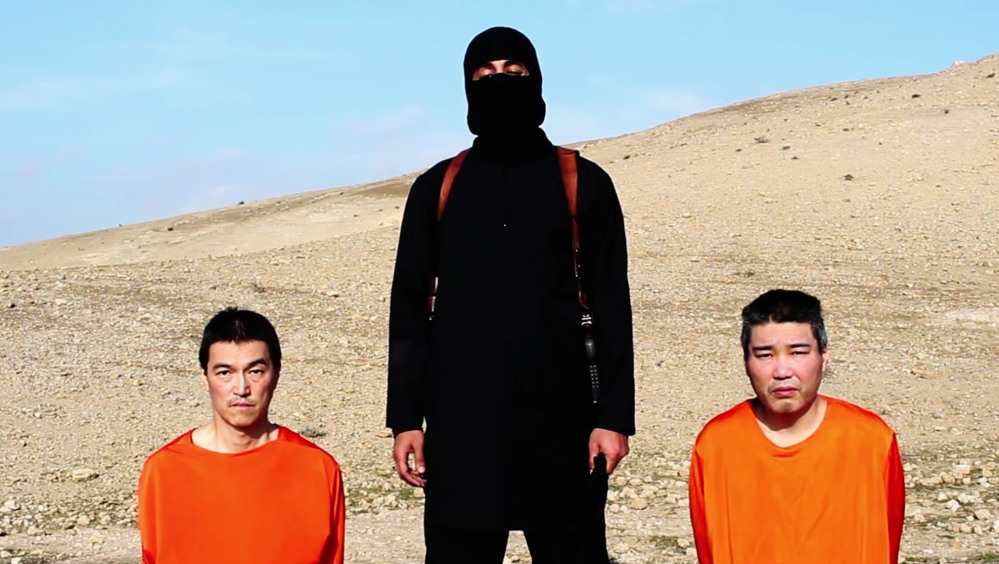PARIS – The profile of “Jihadi John,” the university-educated Londoner whose masked face is emblematic of the grisly executions by the Islamic State group, is vastly different from that of the marginalized men who carried out terror attacks in France and Denmark. That comes as no surprise to those who work with tracking such threats, who say there is no typical terrorist.
Investigators’ jobs have become tougher than ever because of the range of terrorist profiles, and the growing number of potential suspects.
Experts cite three to four types of profiles, with some variations. But they agree that the profile of Mohammed Emwazi, a Kuwait-born man in his mid-20s, raised and educated in Britain, is nothing new. High-profile predecessors include the terrorists from Saudi Arabia who carried out the Sept. 11, 2001, terror attacks in New York and blended easily into the American scene, neither poor nor uneducated.
Emwazi, a computer science graduate with a distinct British accent, has been identified as the man seen in IS videos, knife in hand with a kneeling hostage at his side about to be beheaded.
In contrast, Cherif and Said Kouachi, who massacred cartoonists and others in January in the newsroom of the satirical French weekly Charlie Hebdo, were born in France to Algerian parents and grew up in a working class Paris neighborhood. Amedy Coulibaly, who killed four hostages in a Kosher grocery store, also had working class immigrant roots. The three men befriended each other via prison before the two attacks that left 20 dead, themselves included.
“It is not new, but today it is more obvious than before that we are confronted with a multiplicity of profiles,” said former anti-terrorism judge Jean-Louis Bruguiere who once tracked hundreds of terrorists and their sometimes global networks. “We always have a tendency to seek a single profile that does not exist.”
With multiple profiles and often “weak signals” that must be detected in advance, not everyone ends up on, or stays on, the radar.
“It is evident that it is very complicated for intelligence services,” he said. “Afterward, we say, ‘Why didn’t we see him?’ ”
Emwazi had been known to the British intelligence services since at least 2009, initially in connection with investigations into terrorism in Somalia.
Bruguiere, who retired in 2007, said he arrested hundreds of people during his years investigating terrorists, many who hopped about the globe, and interrogated about 400 of them. He said perhaps 50 of them – at large today – are “more dangerous than the Kouachis.”
“They are on the radar, but you can’t follow them all over the planet,” he said.
Alain Bauer, a leading criminologist who has advised French presidents, says the problem is not about gathering information but about analyzing it.
The day after a terrorist attack, investigators are often looking through “20 pounds of files” that they had before and that shows that in “99 percent of cases,” they might have been able to prevent the attacks if they had only understood the data they had access to, he contended.
For Bauer and others, Emwazi’s profile is practically standard fare: a terrorist who is “educated, middle class, in the middle of two cultures.”
Bauer says two other profiles are also common. One includes working-class roots and a background as a small-time criminal, a definition that describes the Kouachi brothers and Coulibaly, as well as Mohamed Merah who killed three soldiers, a rabbi and three Jewish school children in Toulouse in 2012. Another type, that he calls “ground zero,” is someone who suddenly appears out of nowhere to commit a compulsive act, like the killing of a police officer, and that by definition can neither be detected in advance nor prevented.
Alain Rodier, a one-time intelligence officer now working with the French Center for Intelligence Research, says a terrorist profile is only one minor element used to ferret out suspects and put them on the radar of security services. He contends its only real interest is at a trial.
“The profile is absolutely not the determining element” in tracking suspected terrorists, he said. On the ground tracking, information sharing and other methods are more valuable, he said.
The Internet has added a new layer of complexity with fast-track radicalization that even escapes the notice of families. The process is yet to be fully understood but it is having a major impact on intelligence gathering as nations strive to keep up. France, for example, which has moved into emergency mode since the attacks, is seeking cooperation with giants like Google, Facebook and others to eliminate terrorist propaganda from the Internet.
What is clear is that the mass of suspects imposes a selection process and “some slip through the net,” Rodier said.
Copy the Story LinkSend questions/comments to the editors.



Success. Please wait for the page to reload. If the page does not reload within 5 seconds, please refresh the page.
Enter your email and password to access comments.
Hi, to comment on stories you must . This profile is in addition to your subscription and website login.
Already have a commenting profile? .
Invalid username/password.
Please check your email to confirm and complete your registration.
Only subscribers are eligible to post comments. Please subscribe or login first for digital access. Here’s why.
Use the form below to reset your password. When you've submitted your account email, we will send an email with a reset code.